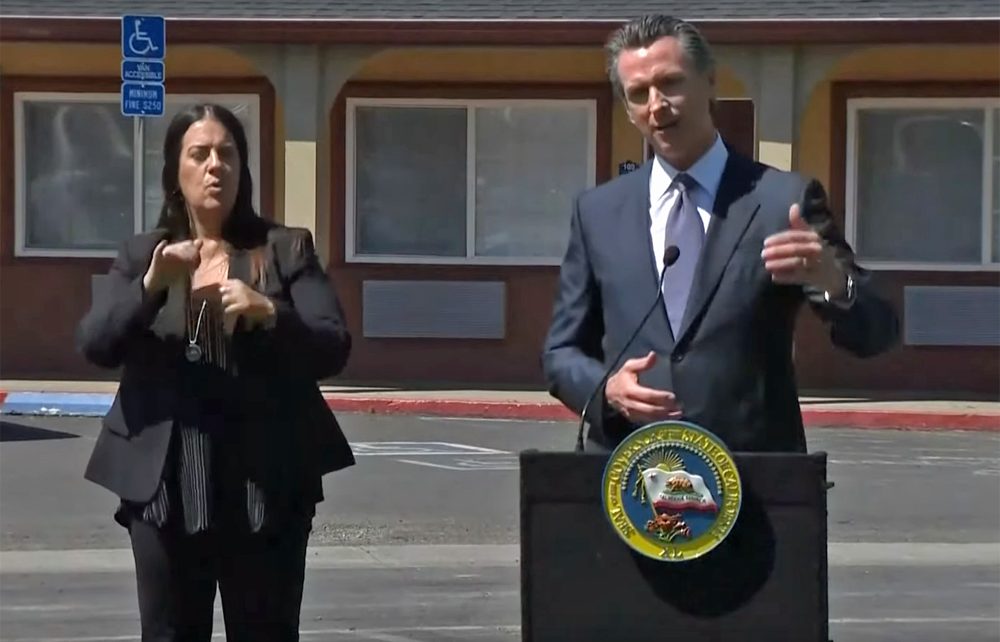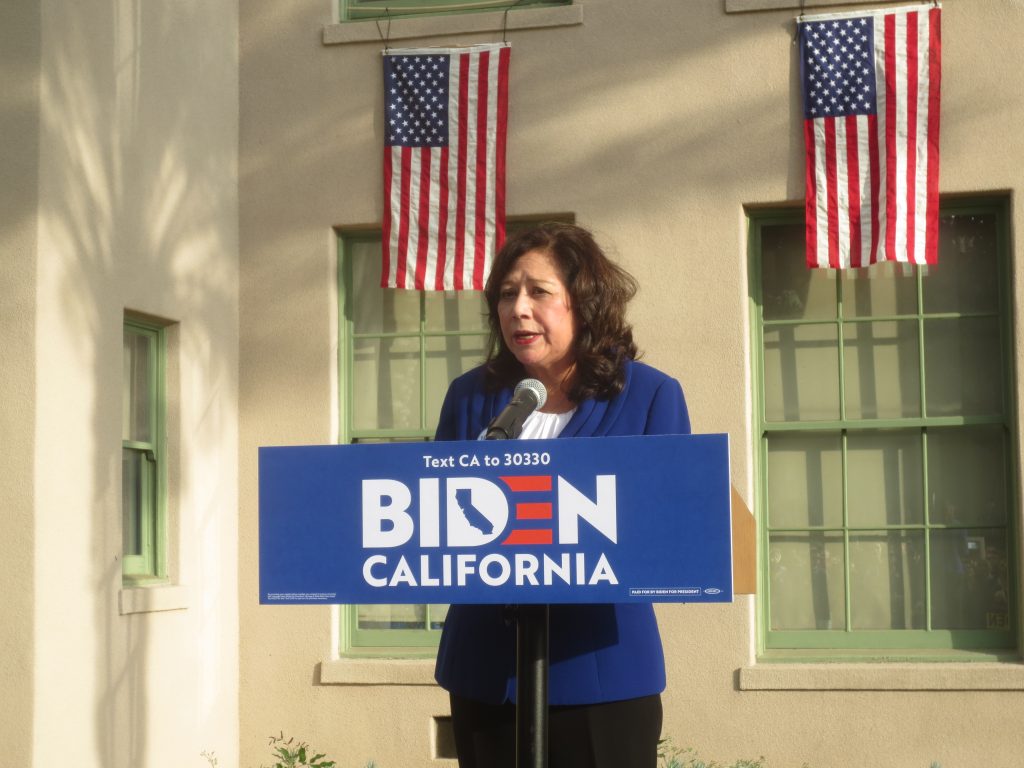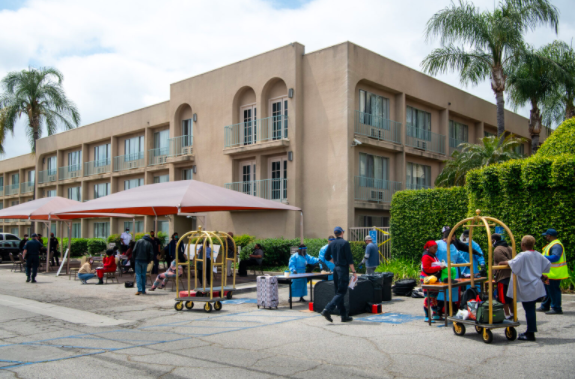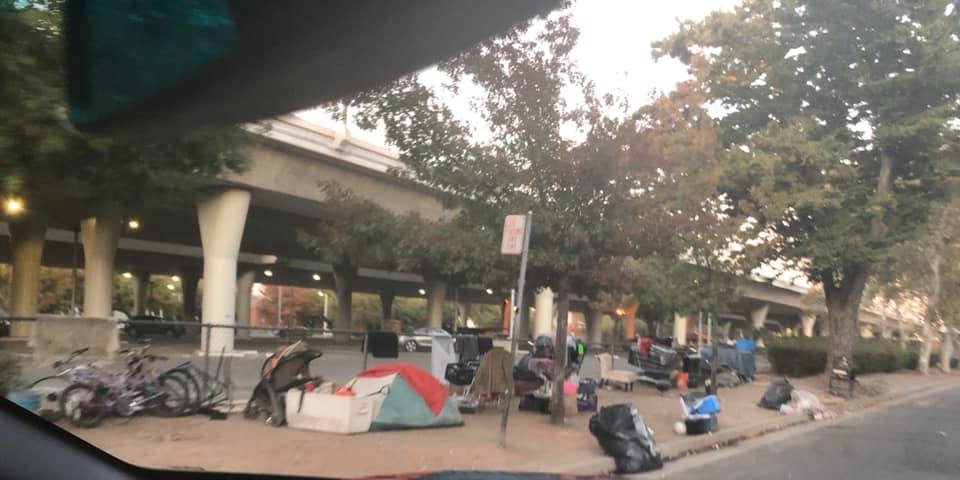
Governor Newsom announced Project Roomkey in Sacramento. (Youtube)
Homeless Begin to Move Into State Funded Hotel Rooms
While social distancing measures are better kept for homeless, an unseen cost looms for the state
By Evan Symon, April 10, 2020 2:15 am
On Wednesday, selected homeless across the state began temporarily moving into state-funded hotel rooms to help slow the spread of the COVID-19 coronavirus.
“We have a moral and ethical responsibility to do our part”

Announced last week by Governor Gavin Newsom and FEMA, “Project Room Key” will put aside 15,000 hotel rooms for homeless in need of shelter. California and the federal government decided to enact the program as both current shelters and outdoor living conditions would quickly spread the virus across the homeless community and could increase the spread to others. The project is expected to help flatten the coronavirus curve in California and save lives through homeless social distancing.
“We have a moral and ethical responsibility to do our part,” said Los Angeles County Commissioner Hilda L. Solis about housing homeless before the coronavirus spreads further. “It’s now more urgent than ever.”
Many homeless have also given thanks for the respite against the virus, which is expected to peak in the next few weeks in California.
Safe haven from the coronavirus
Gary Shane and Max Salazar were 2 of the several dozen put into a Los Angeles hotel on Wednesday.
“It’s not much,” said Shane. “I have a bathroom, a bed, a tv and not too much else. But it’s more than I’ve had since I lost my apartment 3 years ago.”
“It’s been raining like crazy the last few days, and along with the coronavirus, which honestly has scared the hell out of me, it’s been night and day since Monday.”
Salazar also noted the change and how safe it made him.
“I don’t drink, I don’t do any drugs anymore, and I work odd jobs instead of panhandle to get back off my feet,” noted Salazar. “But I always saw addicts get placement in shelters ahead of me. And I thought it would be the same this time around, but I was one of those asked first because of how I’ve been fighting. And with coronavirus coming around, I thought it was the end of the world.”
“This gives me hope. I feel safe for the first time since forever, and now I have a real chance of getting a job again, even with a lot less jobs now.”
“I’m watching it rain right now from inside a place that isn’t a library or a McDonald’s and I don’t have to worry about getting coronavirus.”
“I feel like I need to do something to give back now, you know?”
However, both Gary and Shane’s attitude wasn’t prevalent.
“Many guys just wanted a free room and TV and food. There were guys getting high before going in and things too. Some guy already broke something a few doors down because of a crash earlier. Not everyone appreciates this sort of respite.”
And that may cause a huge problem for all the hotels and motels providing the 15,000 rooms. While concerns over becoming a virus hotspot in areas with at-risk people has caused some hotels to already back out of the program, hotel damages have been a major issue left largely unaddressed by both the state and FEMA.
The high cost of hotel damages
Homeless damages to hotel rooms and campsites have cost counties such as Sacramento County a lot of taxpayer money, and contractors who specialize in hotel repair say that it’s going to cost the state a lot of money.
“I’ve done repairs to hotels and motels that were used to temporarily house homeless people and transients before,” said Scott Weber, a Los Angeles contractor. “Granted, it was never dozens of rooms at a time. It was usually a handful.”
“And what I found that, for a longer term homeless person, they could seriously wreck rooms.”
“I’ll be fair – some didn’t need anything besides a good cleaning, so lets chalk that up to just some deeper cleaning, as they might be afraid of bedbugs and the like.”
“But for rooms I worked on it could be thousands of dollars of damage to a room. I’ve had to repair holes in the wall, yanked out electrical outlets, broken windows, broken light fixtures, broken plumbing. One hotel I worked on had a bathroom counter, a nicer marble one, be broken up by what looked like a hammer.”
“A lot of things are stained, sheets get stained, carpeting gets discolored, and woodwork and walls get scratched. These are just things off the top of my head.”
“So for contractors, like me, I’ll be needed in about one out of every three based on prior experience. Plumbers about the same. You might need some carpet cleaners in here too, a few rooms you might even need exterminators, especially for bed bugs. There’s all the OT you need to give maids too, as a lot of it will be little things. Add all that up in extra costs, parts and labor, and since we’ll be stretched, there might be some extra fees.”
“Let’s be very conservative and average about $500 a room. That’s likely. The homeless won’t be footing the bill as they aren’t exactly paying for the room, right? So 15,000 room at around $500 each, if we’re lucky. That’s $7.5 million. And that’s very conservative. The hotel will have separate costs too, like new sheets, anything stolen, and other replacement costs.”
“Realistically though we’re looking at $10 million or so there all said and done in repairs and restoration. That’s on top of the room costs themselves. And the state pays for it. They always do, them or the county or whoever put them up.”
“No one ever really thinks about this part of hotel rooms for the homeless, but it is something you absolutely need to factor in.”
So far only a portion of the 15,000 hotel rooms have been filled by selected homeless people in the state. Full check-ins are expected within the next few weeks. But in May, when checkouts are expected, California may have an extra 7 or 8 figure bill coming from the hotels.








Don’t worry Californians with a super majority Newsom and his cronies will raise taxes to cover the costs associated with this endeavor. Never mind the taxes that will be imposed to cover covid-19.
They will NOT be Temporary.. The state will assume the costs and the landlords will be happy to have a steady income. In a few months when this is gone. Gel Hair will say that it is a moral responsibility to keep them in the hotels which are clearly becoming flop houses. He’s just grabbing properties and they will be used to keep the bums and they never have to spend any monies on building housing or permits as they just did Eminent Domain..
Who is going to pay for the damage done to these properties….oh wait …WE ARE…nice another reason to screw us over even more.
I’d like to know which Hotels are being used so I can make sure not to stay there.
If you see any of the criminal cops and politicians, register your contempt with them.
What do cops have to do with creating this plan?